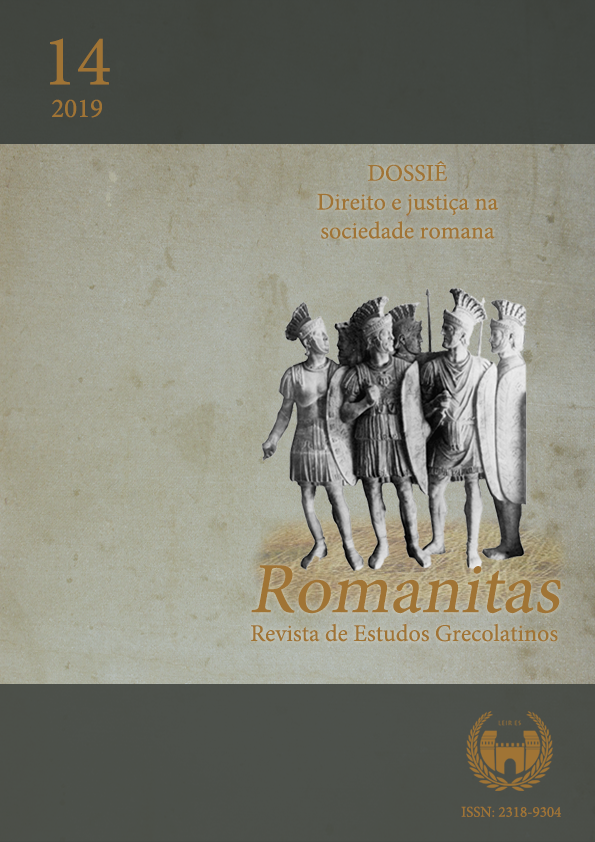Limitations and contradictions of the Roman juridical system: Libanius and his rebukes against the ‘consularis Syriae’ Tisamenus (4th century AD)
DOI:
https://doi.org/10.17648/rom.v0i14.28894Keywords:
Late Antiquity, Governor, Libanius, Justice, TisamenusAbstract
At the end of the Third Century, due to the administrative reforms carried out by Diocletian, occurred a wide conversion of the provincial governors into primary judges. Because of that the expression iudex ordinarius – or simply iudex – became a synonym of governor. So, much more than in the past, the provincial governor will be forced to deal with a rising amount of judicial demands. In this article, we aim to analyse the accusations brought by Libanius against the consularis Syriae Tisamenus who, according the author, would not be fulfilling his duties in a efficient way, leaving without support a great number of citizens. By means of the Libanius’ writings it is possible to grasp the provincials’ opinion regarding the governors appointed by Rome, especially regarding their role as judges in a context of acute social polarization, being the pauperis frequently victimized by the potentes.
Downloads
References
Documentação textual
LIBANIUS. To the emperor, on the prisoners (Or. XLV). In: _______. Selected orations. Edited and translated by A. F. Norman. Cambridge: Harvard University Press, 1969, p. 161-193. v. II.
LIBANIUS. To the emperor Theodosius against Tisamenus (Or. XXXIII). In: _______. Selected orations. Edited and translated by A. F. Norman. Cambridge: Harvard University Press, 1969, p. 194-233. v. II.
PHARR, C.; DAVIDSON, T. S. (Ed.). The Theodosian Code and novels, and Sirmondian Constitutions. Princeton: Princeton University Press, 1952.
Obras de apoio
BRAVO, G. Historia de la Roma antigua. Madrid: Alianza, 2001.
BRYEN, A. Z. Judging Empire: courts and culture in Rome’s Eastern provinces. Law and History, v. 30, n. 3, p. 771-811, 2012.
BURTON, G. P. Proconsuls, assizes and the administration of justice under the Empire. The Journal of Roman Studiees, v. 65, p. 92-106, 1975.
CARRIÉ, J. M.; ROUSSELLE, A. L’Empire Romaine en mutation: des Sevères à Constantin (192-337). Paris: Seuil, 1999.
CZAIJOWSKY, K. Law, status and agency in the Roman provinces. Past and Present, n. 241, p. 1-29, 2018.
DRINKWATER, J. Maximinus to Diocletian and the ‘crisis’. In: BOWMAN, A. K.; GARNSEY, P.; CAMERON, A. (Ed.). The Cambridge Ancient History. Cambridge: Cambridge University Press, 2008, p. 28-66. v. XII.
ENGEL, J. M.; PALANQUE, J. R. O Império Romano. São Paulo: Atlas, 1978.
GARNSEY, P. The criminal jurisdiction of governors. The Journal of Roman Studies, v. 58, p. 1-1, p. 51-59, 1968.
GONZÁLEZ GÁLVEZ, A. Introducción. In: LIBANIO. Discursos II. Introducción, traducción y notas de Ángel González Gálvez. Madrid: Gredos, 2001, p. 257-261.
HARRIES, J. Law & Empire in Late Antiquity. Cambridge: Cambridge University Press, 1999.
JONES, A. H. M. The Later Roman Empire (284-602). Oxford: Basil Blackwell, 1964. v. I.
KELLY, C. Corruption. In: HORNBLOWER, S.; SPAWFORTH, A.; EIDINOW, E. (Ed.). The Oxford Classical Dictionary. Oxford: Oxford University Press, 2012, p. 386.
LAVAN, L. The political topography of the Late Antique city: activity spaces in practice. In: LAVAN, L.; BOWDEN, W. (Ed.). Theory and practice in Late Antiquity. Leiden: Brill, 2003, p. 314-337.
LIMA NETO, B. M. Entre a filosofia e a magia: o caso da estigmatização de Apuleio na África romana (século II d.C.). Curitiba: Prismas, 2016.
LINTOTT, A. Crime and punishment. In: JOHNSTON, D. (Ed.). The Cambridge Companion to Roman Law. Cambridge: Cambridge University Press, 2015, p. 301-331.
LO CASCIO, E. The new state of Diocletian and Constantine: from the Tetrarchy to the reunification of the Empire. In: BOWMAN, A. K.; GARNSEY, P.; CAMERON, A. (Ed.). The Cambridge Ancient History. Cambridge: Cambridge University Press, 2008, p. 170-183. v. XII.
NORMAN, A. F. Introduction. In: LIBANIUS. Selected orations. Edited and translated by A. F. Norman. Cambridge: Harvard University Press, 1969, p. 155-159.
OLSON, M. Philosophies of imprisonment in Late Antiquity. Constructing the past, v. 9, i. 1, p. 30-46, 2018.
RICHARDSON, J. Roman Law in the provinces. In: JOHNSTON, D. (Ed.). The Cambridge Companion to Roman Law. Cambridge: Cambridge University Press, 2015, p. 45-58.
RIEMSCHNEIDER, K. K. Prison and punishment in Early Anatoly. Journal of the Economic and Social History of the Orient, v. 20, n. 1, p. 114-126, 1977.
ROUECHÉ, C. The functions of the governor in Late Antiquity: some observations. Antiquité Tardive, n. 6, p. 31-36, 1998.
ROUECHÉ, C. Acclamations in the Later Roman Empire: new evidence from Aphrodisias. The Journal of Roman Studies, v. 74, p. 181-199, 1984.
SANTALUCÍA, B. Diritto e processo penale nell’antica Roma. Milano: Giuffré, 1998.
SIRKS, A. J. B. Public Law. In: JOHNSTON, D. (Ed.). The Cambridge Companion to Roman Law. Cambridge: Cambridge University Press, 2015, p. 332-352.
SILVA, G. V.; MENDES, N. M. Diocleciano e Constantino: a construção do Dominato. In: SILVA, G. V.; MENDES, N. M. (Org.). Repensando o Império Romano. Rio de Janeiro: Mauad, 2006, p. 193-221.
SLOOTJES, D. The governor and his subjects in the Later Roman Empire. Leiden: Brill, 2006.
WATSON, L. Invective. In: HORNBLOWER, S.; SPAWFORTH, A.; EIDINOW, E. (Ed.). The Oxford Classical Dictionary. Oxford: Oxford University Press, 2012, p. 740.
WATSON, T. W. The rhetoric of corruption in Late Antiquity. 2010. Dissertation (Doctor of Philosophy in Classics) – University of California, Riverside, 2010.
Downloads
Published
How to Cite
Issue
Section
License

This work is licensed under a Creative Commons Attribution-NonCommercial-NoDerivatives 4.0 International License.
a. The authors retain copyright and grant the journal the right to first publication.
b. The authors are authorized to assume additional contracts separately, for non-exclusive distribution of the version of the work published in this journal (e.g., publishing in institutional repository or as a book chapter), with acknowledgment of authorship and initial publication in this journal.
c. Authors are allowed and encouraged to publish and distribute their work online (e.g. in institutional repositories or on their personal page) after the first publication by the journal, with due credit.
d. The journal's texts are licensed under a CC BY 4.0 Deed Attribution 4.0 International Licence (CC BY).




























